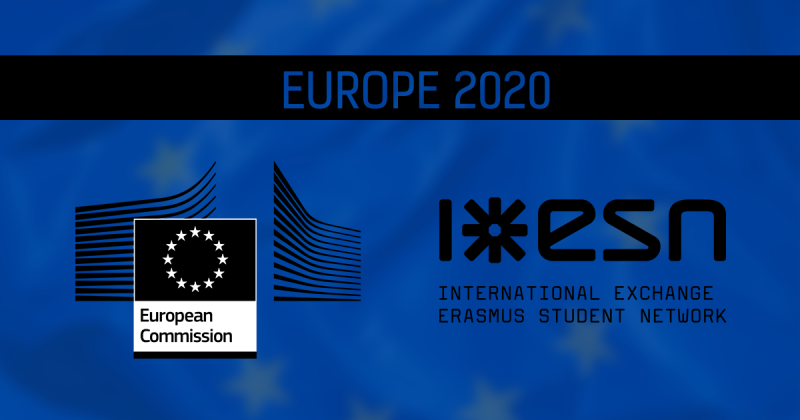
The Erasmus Student Network (ESN AISBL) would like to present its reaction to the Public Consultation on the Europe 2020 Strategy by the European Commission.
Background for the public consultation
The Europe 2020 strategy was launched in March 2010 as the EU's strategy for promoting smart, sustainable and inclusive growth. It aims to achieve a knowledge-based, competitive European economy while preserving the EU's social market economy model and improving resource efficiency. It was thus conceived as a partnership between the EU and its Member States driven by the promotion of growth and jobs.
The Europe 2020 strategy is built around five headline targets in the areas of employment, research and development, climate and energy, education and the fight against poverty and social exclusion. The strategy also set out a series of action programmes, called "flagship initiatives", in seven fields considered to be key drivers for growth, namely innovation, the digital economy, employment and youth, industrial policy, poverty and resource efficiency. The objectives of the strategy are also supported by action at EU level in areas such as the single market, the EU budget and the EU external agenda.
After four years, the Commission has proposed, and the European Council of 20-21 March 2014 has agreed, to initiate a review of the Europe 2020 strategy. On 5 March 2014, the Commission adopted a Communication "Taking stock of the Europe 2020 strategy for smart, sustainable and inclusive growth" (Communication and Annexes). drawing preliminary lessons on the first years of implementation of the strategy. Building on these first outcomes and in a context of a gradual recovery of the European economies, it is time to reflect on the design of the strategy for the coming years.
Our opinion
The most relevant elements for us are the Youth on the Move initiative and the headline target of reaching 40% tertiary attainment by 2020. Connected to those targets we also associate the ET2020 Strategic Framework which plays a crucial role for us and the achievement of general priorities.
The Europe2020 strategy had a clear impact on a wide range of issues and in particular on our sector of expertise – Education & Training. The new Erasmus+ programme supports the knowledge triangle (education, research & innovation) and puts additional emphasis on mobility and internationalisation of Higher Education. These two aspects are substantially contributing to reaching the headline targets of EU2020 – 75% employment and poverty reduction and social inclusion. Studies (Erasmus Impact Study, ESNSurveys and others) have shown that especially youth mobility has a great impact on the self-development of young people (e.g. Erasmus Impact Study: 81% perceive a substantial improvement of their transversal skills) and quality of Education.
Being an organisation in the field of education, we are naturally more interested in the education-related targets than other organisations. Given our deep belief in the wonders of mobility in general and student mobility in particular, we would like to see a Europe 2020 target similar to the ET2020 strategic objective “making lifelong learning and mobility a reality”. A new target for the second half of Europe2020 could be, for example, “X % of all higher education students should be mobile and Y % of all the degrees (Bachelor, Master, PhD) earned at European higher education institutions should be earned by nationals of another country than that of the host institutions”.
Please, find attached the PDF document with the answers to the Europe 2020 questionnaire.


Follow ESN